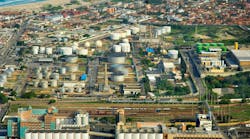By an OGJ correspondent
RIO DE JANEIRO, Feb.11 -- An official of Petroleo Brasileiro SA (Petrobras), requesting anonymity, told OGJ that the company has discovered in the Santos basin off Brazil a super-giant field containing reserves estimated at 800 million to 1 billion bbl of 40° gravity crude oil.
Petrobras declined to confirm this information officially for public consumption.
According to the source, the 1-RJS-582 discovery well was spudded in August of last year on Block BS-500 in 1,500 m of water and at 6,000 m TD. Additional wells will have to be drilled to delineate the area of the field, the official said.
The National Petroleum Agency (ANP) granted the concession for Block BS-500 to Petrobras in 1998 and, as of March 2002, Petrobras had reported 14 hydrocarbon strikes on the block.
Santos basin, Brazil's largest, occupies an area of 352,000 sq km off the states of Santa Catarina, Paraná, São Paulo, and Rio de Janeiro states. Block BS-500 is off Rio de Janeiro state.
Petrobras technicians considered initial tests successful, the official said, and additional tests are under way to evaluate the commerciality of the field.
Santos basin has reservoirs varying from Tertiary to Cretaceous.
Last year, then Petrobras exploration and production director José Coutinho Barbosa, hypothesized that there were large amounts of light crude in Santos basin. "Brazil is not destined to discover only heavy crude. We are developing new geologic models which will indicate the most probable areas where light crude can be found," Barbosa said.
João Carlos França de Luca, president of Repsol-YPF SA in Brazil and a former Petrobras E&P director, said the confirmation of these new reserves could open a new frontier for Brazil's oil activities.
"If the commercial viability of the area is confirmed, further multinational oil companies will set up shop in Brazil," he added.
Refining impact
Brazil has the largest oil products market in South America because it is the largest country on the continent, with 170 million inhabitants.
Petrobras dominates Brazil's refining industry, owning 11 of the country's 13 refineries, and it owns 98% of the country's installed capacity of nearly 2 million b/d, although utilization is significantly lower.
The discovery of large reserves of light crude could open new perspectives for Brazil's refining industry, say analysts. Crude oil produced in Brazil to date—with the exception of Roncador field in Campos basin off Rio de Janeiro state—is heavy, raising production costs while lowering the commodity's market value.
This has introduced another challenge downstream, where there is insufficient refining capacity to process the rising volume of heavy crude oil, forcing Petrobras to import light crude, mainly from the Middle East.
The new Brazilian government that took office in January is mulling the construction of a new refinery, probably in partnership with private investment interests. The government is under heavy pressure to select a site, particularly by the governments of Rio de Janeiro and the northern state of Ceara, each of which wants the refinery built in its own state.
Because Rio de Janeiro produces 80% of the country's crude oil output (from the Campos basin), the logic is for the government to build the new refinery in that state. It produces more petroleum and is located in the southern region of the country, which has more consumers than the north.
Petrobras already has its own refinery-upgrade program, under which it will spend about $1 billion/year during 2002-05, mainly to adapt its refineries to increasing amounts of heavy crude to improve quality, and to tighten health, safety, and environmental standards. But much more investment is needed, hence the interest in foreign private investment.
So far however, interest from private sector firms in investing in Brazilian refining has been scant, but upstream success in Block BS-500 could change that, said an oil industry analyst.
